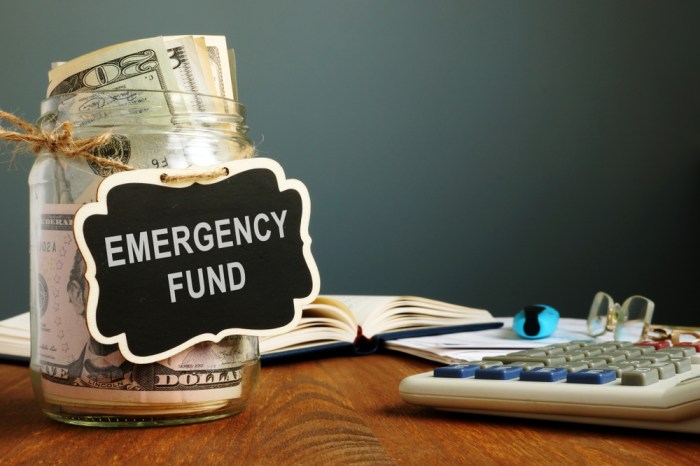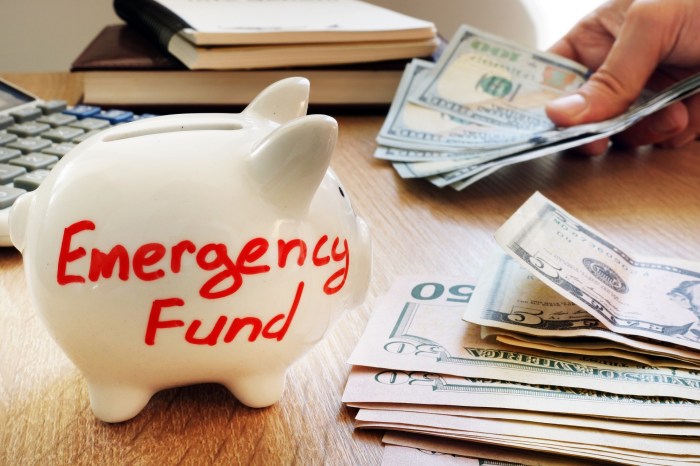Yo, diving into the world of emergency funds, where being financially prepared is key. From unexpected situations to smart saving strategies, we’ve got you covered with all you need to know.
Let’s break it down and get you on the path to financial security.
Importance of Emergency Funds

Having emergency funds is crucial for unexpected situations that may arise without warning. It provides a safety net to cover expenses when faced with financial emergencies.
Examples of Unexpected Situations
- Medical emergencies that require immediate treatment and hospitalization.
- Car repairs or breakdowns that are essential for daily transportation to work or school.
- Job loss or sudden reduction in income that affects the ability to cover bills and living expenses.
Recommended Amount of Emergency Funds
Financial experts often recommend saving three to six months’ worth of living expenses in an emergency fund. This amount can vary depending on individual circumstances, such as job stability, family size, and monthly expenses.
Building an Emergency Fund
Building an emergency fund is crucial for financial stability and peace of mind. It involves setting aside money specifically for unexpected expenses or financial emergencies that may arise.
Different Strategies for Building an Emergency Fund
- Automate Your Savings: Set up automatic transfers from your checking account to your emergency fund to ensure consistent contributions.
- Cut Expenses: Review your budget and identify areas where you can reduce spending to free up more money for your emergency fund.
- Side Hustle: Consider taking on a part-time job or freelancing to earn extra income to boost your emergency fund.
- Sell Unused Items: Declutter your home and sell items you no longer need to add to your emergency fund.
Concept of Paying Yourself First
Paying yourself first means prioritizing saving for your future before spending on other expenses. By setting aside a portion of your income for your emergency fund as soon as you get paid, you ensure that saving becomes a non-negotiable part of your financial routine.
Tips for Staying Motivated and Consistent
- Set Clear Goals: Define specific savings goals for your emergency fund to keep you motivated.
- Reward Yourself: Celebrate milestones in your savings journey to stay motivated and reinforce positive saving habits.
- Track Your Progress: Regularly monitor your emergency fund balance to see how far you’ve come and stay committed to your savings goals.
- Stay Disciplined: Remember the importance of having a financial safety net and stay focused on building and maintaining your emergency fund.
Where to Keep Emergency Funds
When it comes to storing your emergency funds, it’s important to consider different options that can help you access your money quickly when needed. Let’s compare some popular choices like savings accounts, money market accounts, and CDs to determine the best fit for your financial goals.
Savings Accounts
- Savings accounts offer easy access to your funds with no penalties for withdrawals.
- They provide liquidity and security for your emergency savings.
- However, the interest rates on savings accounts are typically lower compared to other options.
Money Market Accounts
- Money market accounts offer higher interest rates than traditional savings accounts.
- They also provide easy access to funds, but with some restrictions like minimum balance requirements.
- Money market accounts may offer limited check-writing abilities for quick access to funds.
CDs (Certificates of Deposit)
- CDs usually offer higher interest rates than savings or money market accounts.
- They require you to lock in your funds for a specific term, ranging from a few months to several years.
- Early withdrawal from a CD may incur penalties, making it less flexible for emergency funds.
Choose an account that balances accessibility with interest rates, considering your emergency fund needs and financial goals.
Using Emergency Funds Wisely

To ensure the effectiveness of emergency funds, it is crucial to use them wisely in times of need. Proper usage can help individuals navigate unexpected financial challenges without causing long-term negative impacts on their financial health.
Appropriate Use of Emergency Funds
- Medical emergencies, such as unexpected hospitalization or surgery.
- Car repairs or maintenance to ensure safe transportation.
- Home repairs for essential systems like plumbing or electrical issues.
Importance of Replenishing Emergency Funds
- Replenishing emergency funds after use ensures financial stability in the event of future emergencies.
- Regular contributions help maintain the fund’s value and readiness for unforeseen circumstances.
- Having a fully funded emergency fund provides peace of mind and reduces financial stress.